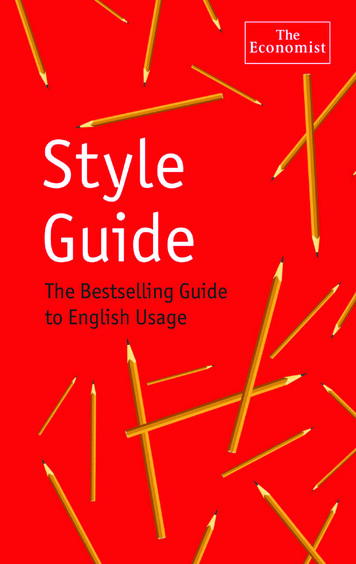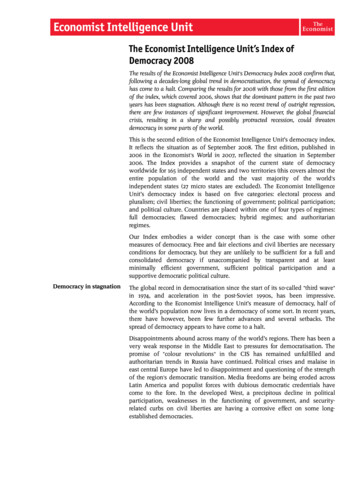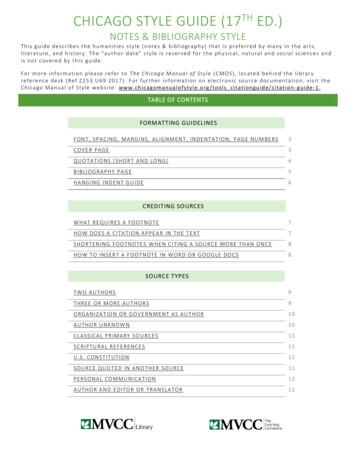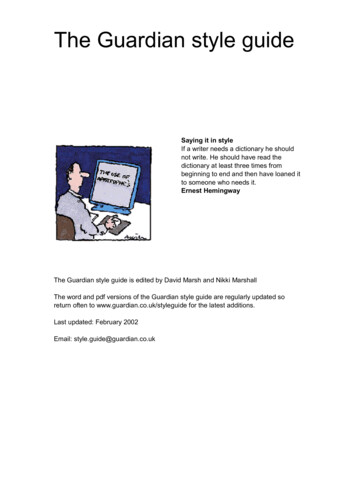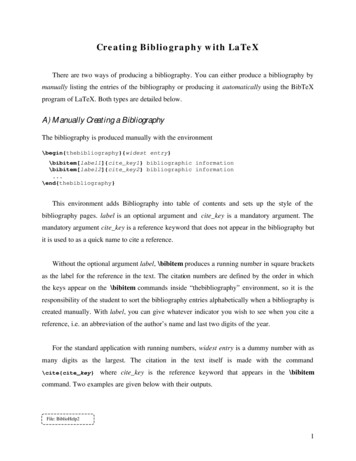
Transcription
4 color process, CMYKmatte lamination. p 2 indicates spot gloss laminationREFERENCEGOOD WRITING ISTHE KEY TO BEING UNDERSTOOD.Cover design byNathan Burton11TH EDITION 16.99/ 21.50 CANT HE BEST SEL L INGGUIDE T O ENGL ISH USAGEGU ED{The Style Guide is the most succinct, accessible, and helpfulguide to the English language in all its forms—and requiredreading for anyone who wants to communicate with style.LTES{ Commonly misused words and phrases Spelling tricky words Avoiding clichés and jargon The key differences between British and American EnglishSTYLE GUIDEWhether you are writing a news article or a job application,clarity is vital. Used by writers all over the world, and derivedfrom the guidelines used to edit and write The Economist, thisbook offers practical advice that will help you write withlucidity and elegance. In addition to addressing questions ofgrammar, syntax, and punctuation, the Style Guide containsindispensable guidance on:11THEDNOIIT“The best guide of its kind. Indispensable.” —Bill Bryson
Style Guide11th EditionPUBLICAFFAIRSNew York9781610395380-StyleGuide.indd 14/3/15 1:39 PM
The Economist in Association with Profile Books Ltd. and PublicAffairsCopyright The Economist Newspaper Ltd, 1986, 1991, 1993, 1996, 1998,2000, 2001, 2003, 2005, 2010, 2013, 2015First published by Profile Books Ltd. in Great Britain.Published in 2015 in the United States by PublicAffairs , a Member of the Perseus BooksGroupAll rights reserved.Printed in the United States of America.No part of this book may be reproduced, stored in or introduced into a retrieval system,or transmitted, in any form or by any means (electronic, mechanical, photocopying,recording or otherwise), without the prior written permission of both the copyright ownerand the publisher of this book, except in the case of brief quotations embodied in criticalarticles and reviews. For information, address PublicAffairs, 250 West 57th Street, 15thFloor, New York, NY 10107.The greatest care has been taken in compiling this book. However, no responsibility canbe accepted by the publishers or compilers for the accuracy of the information presented.Where opinion is expressed it is that of the author and does not necessarily coincide withthe editorial views of The Economist Newspaper.While every effort has been made to contact copyright-holders of material produced orcited in this book, in the case of those it has not been possible to contact successfully, theauthor and publishers will be glad to make amendments in further editions.PublicAffairs books are available at special discounts for bulk purchases in the U.S. bycorporations, institutions, and other organizations. For more information, please contactthe Special Markets Department at the Perseus Books Group, 2300 Chestnut Street, Suite200, Philadelphia, PA 19103, call (800) 810-4145, ext. 5000, or e-mail special.markets@perseusbooks.com.Typeset in EcoType by MacGuru Ltdinfo@macguru.org.ukLibrary of Congress Control Number: 2015936805ISBN 978-1-61039-538-0 (PB)ISBN 978-1-61039-575-5 (EB)First Edition10 9 8 7 6 5 4 3 2 19781610395380-StyleGuide.indd 24/3/15 1:39 PM
ContentsPrefacevIntroduction1part 1 The essence of style5part 2 American and British English159part 3 Useful reference179Index9781610395380-StyleGuide.indd 32654/3/15 1:39 PM
9781610395380-StyleGuide.indd 44/3/15 1:39 PM
PrefaceEvery newspaper has its own style book, a set of rules tellingjournalists whether to write e-mail or email, Gadaffi or Qaddafi,judgement or judgment. The Economist’s style book does this anda bit more. It also warns writers of some common mistakes andencourages them to write with clarity and simplicity.All the prescriptive judgments in the style guide are directlyderived from those used each week in writing and editing TheEconomist.This eleventh edition of the “The Economist Style Guide” is inthree parts. The first is based on the style book used by those whoedit The Economist; it is largely the work of John Grimond, whoover the years was editor of the Britain, United States and Foreignsections, before retiring in 2013. Johnny is a hard act to follow, andhe left at a time when proper English usage seemed in full retreatin the face of texting, Tweeting and internet jargon generally. Hiswork still stands as a bulwark against it, as well as a monument tohis impish wit and his sense of euphony, rightness and correctness.If slight cracks have now appeared in the bulwark, it is becauselanguage is a living thing that continually changes; some changes arebenign, and some (such as the pervasive “smartness” of the digitalage) simply cannot be resisted.The second part of the book, on American and British English,describes some of the main differences between the two greatEnglish-speaking areas in spelling, grammar and usage.To make the style guide of greater general interest, Part 3 consistsof handy reference material that might appeal to readers of TheEconomist.Throughout the text, italic type is used for examples exceptwhere they are presented in lists, when the type is roman, as thisv9781610395380-StyleGuide.indd 54/3/15 1:39 PM
Style Guidetext is. Words in bold indicate a separate but relevant entry, thatis, a cross-reference. Small capitals are used only in the way TheEconomist uses them, for which see the entry abbreviations.Many people have been involved in this book as it has developedand changed over the years. Thanks are due to all of them, withspecial thanks to Penny Butler, Ingrid Esling, Graham Douglas andPenny Garrett, whose help has been invaluable and continues to beso.Ann Wroe,Obituaries Editor, The EconomistMarch 2015vi9781610395380-StyleGuide.indd 64/3/15 1:39 PM
IntroductionOn only two scores can The Economist hope to outdo its rivalsconsistently. One is the quality of its analysis; the other is the qualityof its writing. The aim of this book is to give some general advice onwriting, to point out some common errors and to set some arbitraryrules.The first requirement of The Economist is that it should be readilyunderstandable. Clarity of writing usually follows clarity of thought.So think what you want to say, then say it as simply as possible.Keep in mind George Orwell’s six elementary rules:123456Never use a metaphor, simile or other figure of speech whichyou are used to seeing in print (see metaphors).Never use a long word where a short one will do (see shortwords).If it is possible to cut out a word, always cut it out (seeunnecessary words).Never use the passive where you can use the active (see grammarand syntax).Never use a foreign phrase, a scientific word or a jargon word ifyou can think of an everyday English equivalent.Break any of these rules sooner than say anything outrightbarbarous.Readers are primarily interested in what you have to say. By theway in which you say it, you may encourage them either to read onor to give up. If you want them to read on:Catch the attention of the reader and then get straight into thearticle. Do not spend several sentences clearing your throat,setting the scene or sketching in the background. Introduce thefacts as you tell the story and hold the reader by the way you19781610395380-StyleGuide.indd 14/3/15 1:39 PM
Style Guideunfold the tale and by a fresh but unpretentious use of language.In starting your article, let your model be the essays ofFrancis Bacon. He starts “Of Riches” with “I cannot call richesbetter than the baggage of virtue.” “Of Cunning” opens with“We take cunning for a sinister or crooked wisdom.” “OfSuspicion” is instantly on the wing with “Suspicions amongstthoughts are like bats amongst birds, they ever fly by twilight.”Each of these beginnings carries implicitly within it an entireessay. Each seizes the reader by the lapels and at once draws himinto the subject. No gimmickry is needed, no flowery language,no literary contrivance. Plain words on their own carry enoughmeaning to provoke an intriguing thought, stir the reader’scuriosity and thus make him want to continue.You must strive for a similar effect. Articles in The Economistshould be like essays, in that they have a beginning, a middleand an end. They should not be mere bits of informationstitched together. Each should be a coherent whole, a series ofparagraphs that follow logically in order and, ideally, will sufferif even one sentence is cut out. If the article is a report, the factsmust be selected and presented as a story. If it is a leader ormore analytical article, it should also have a sense of sequence,so that the reader feels he is progressing from a beginning to aconclusion.Either way, it is up to you to provide the ideas, analysisand argument that bind the elements of the article together.That is the hard part. Once you have them, though, you needonly plain, straightforward words to express them. Do notimagine that you can disguise the absence of thought with longwords, stale metaphors or the empty jargon of academics. Inmoderation, however, you can enliven your writing with a freshmetaphor, an occasional exuberance or an unusual word orphrase that nicely suits your purpose.Read through your writing several times. Edit it ruthlessly, whetherby cutting or polishing or sharpening, on each occasion.Avoid repetition. Cut out anything superfluous. And resistany temptation to achieve a literary effect by making ellipticalremarks or allusions to unexplained people or events. Rather,29781610395380-StyleGuide.indd 24/3/15 1:39 PM
introductionhold your reader’s attention by keeping the story moving. If thetale begins to flag, or the arguments seem less than convincing,you can rescue it only by the sharpness of your mind. Nothingis to be gained by resorting to orotundities and grandiloquence,still less by calling on clichés and vogue expressions. Unadorned,unfancy prose is usually all you need.Do not be stuffy. “To write a genuine, familiar or truly Englishstyle”, said Hazlitt, “is to write as anyone would speak incommon conversation who had a thorough command orchoice of words or who could discourse with ease, force andperspicuity setting aside all pedantic and oratorical flourishes.”Use the language of everyday speech, not that of spokesmen,lawyers or bureaucrats (so prefer let to permit, people to persons,buy to purchase, colleague to peer, way out to exit, present to gift,rich to wealthy, show to demonstrate, break to violate). Pomposityand long-windedness tend to obscure meaning, or reveal the lackof it: strip them away in favour of plain words.Do not be hectoring or arrogant. Those who disagree with you arenot necessarily stupid or insane. Nobody needs to be describedas silly: let your analysis show that he is. When you expressopinions, do not simply make assertions. The aim is not just totell readers what you think, but to persuade them; if you usearguments, reasoning and evidence, you may succeed. Go easyon the oughts and shoulds.Do not be too pleased with yourself. Don’t boast of your owncleverness by telling readers that you correctly predictedsomething or that you have a scoop. You are more likely to boreor irritate them than to impress them.Do not be too chatty. Surprise, surprise is more irritating thaninformative. So is Ho, ho and, in the middle of a sentence, waitfor it, etc.Do not be too didactic. If too many sentences begin Compare,Consider, Expect, Imagine, Look at, Note, Prepare for, Remember orTake, readers will think they are reading a textbook (or, indeed, a39781610395380-StyleGuide.indd 34/3/15 1:39 PM
Style Guidestyle book). This may not be the way to persuade them to renewtheir subscriptions.Do your best to be lucid. (“I see but one rule: to be clear”, Stendhal.)Simple sentences help. Keep complicated constructions andgimmicks to a minimum, if necessary by remembering the NewYorker’s comment: “Backward ran sentences until reeled themind.”Mark Twain described how a good writer treats sentences:“At times he may indulge himself with a long one, but hewill make sure there are no folds in it, no vaguenesses, noparenthetical interruptions of its view as a whole; when he hasdone with it, it won’t be a sea-serpent with half of its archesunder the water; it will be a torch-light procession.”Long paragraphs, like long sentences, can confuse the reader.“The paragraph”, according to Fowler, “is essentially a unit ofthought, not of length; it must be homogeneous in subject matterand sequential in treatment.” One-sentence paragraphs shouldbe used only occasionally.Clear thinking is the key to clear writing. “A scrupulouswriter”, observed Orwell, “in every sentence that he writes willask himself at least four questions, thus: What am I trying tosay? What words will express it? What image or idiom will makeit clearer? Is this image fresh enough to have an effect? And hewill probably ask himself two more: Could I put it more shortly?Have I said anything that is avoidably ugly?”Scrupulous writers will also notice that their copy is editedonly lightly and is likely to be used. It may even be read.49781610395380-StyleGuide.indd 44/3/15 1:39 PM
part 1The essence of style9781610395380-StyleGuide.indd 54/3/15 1:39 PM
aa or the see grammar and syntax.abbreviationsWrite words in their full form on first appearance:Trades Union Congress (not tuc), Troubled Asset Relief Programme(not tarp)unless an abbreviation or acronym is so familiar that it is usedmore often in full:aids bbc cia eu fbi hiv imf nato ngo oecd unescoor unless the full form would provide little illumination –awacs, dna. If in doubt about its familiarity, explain what theorganisation is or does. After the first mention, try not to repeatthe abbreviation too often; so write the agency rather than theiaea, the party rather than the kmt, to avoid spattering the pagewith capital letters. And prefer chief executive, boss or manager toceo.There is no need to give the initials of an organisation if it isnot referred to again. This clutters both the page and the brain.Do not use spatterings of abbreviations and acronymssimply in order to cram more words in; you will end up irritatingreaders rather than informing them. An article in a recent issueof The Economist contained the following:cia dci dni dod dvd fbi nctc nsaSome of these are well known to most readers and can readilybe held in the mind. But unfamiliar abbreviations may oblige thereader to constantly refer back to the first use.69781610395380-StyleGuide.indd 64/3/15 1:39 PM
a or the abbreviationsampersands should be used:123when they are part of the name of a company:Procter & Gamble Pratt & Whitneyfor such things as constituencies, where two names arelinked to form one unit:The rest of Brighouse & Spenborough joins with the Batley partof Batley & Morley to form Batley & Spen.The area thus became the Pakistani province of Kashmir and theIndian state of Jammu & Kashmir.in r&d and s&1.definite article If an abbreviation can be pronounced – cosatu,nato, unesco – it does not generally require the definitearticle. Other organisations, except companies, should usually bepreceded by the:the bbc the kgb the nhs the niesr the unhcrelements do not take small caps when abbreviated:carbon dioxide is CO2lead is Pbmethane is CH4However:chlorofluorocarbons are cfcsthe oxides of nitrogen are generally noxDifferent isotopes of the same element are distinguished byraised (superscript) prefixes:carbon-14 is 14Chelium-3 is 3HeDo not sprinkle chemical symbols unnecessarily: they mayput readers off. But common abbreviations such as CO2 maysometimes be used for variety.headings, cross-heads, captions, etc In headings, rubrics, crossheads, footnotes, captions, tables, charts (including sources), useordinary caps, not small caps.initials in people’s and companies’ names take points (with a79781610395380-StyleGuide.indd 74/3/15 1:39 PM
part 1: the essence of stylespace between initials and name, but not between initials). Ingeneral, follow the practice preferred by people, companies andorganisations in writing their own names, for example:I.M. Pei J.C. Penney J. Sainsbury A.N. Wilsonjunior and senior Spell out in full (and lower case) junior andsenior after a name:George Bush junior George Bush seniorlower case Abbreviate:kilograms (not kilogrammes) to kg (or kilos)kilometres per hour to kphkilometres to kmmiles per hour to mphUse lower case for kg, km, lb (never lbs), mph and othermeasures, and for ie, eg; ie should be followed by a comma.When used with figures, these lower-case abbreviations shouldfollow immediately, with no space:11am 4.30pm 15kg 35mm 100mph 78rpmTwo abbreviations together, however, must be separated: 60mb/d. Use b/d not bpd as an abbreviation for barrels per day.MPs Except in British contexts, use mp only after first spelling outmember of Parliament in full (in many places an mp is a militarypoliceman).Members of the European Parliament are meps (not Euro-mps).Members of the Scottish Parliament are msps.Members of the Welsh Assembly are ams (Assembly Members).organisationsefta is the European Free Trade Association.The fao is the Food and Agriculture Organisation.The fda is the Food and Drug Administration.The ida is the International Development Association.nafta is the North American Free-Trade Agreement.The plo is the Palestine Liberation Organisation.89781610395380-StyleGuide.indd 84/3/15 1:39 PM
abbreviationspronounceable abbreviationsAbbreviations that can be pronounced and are composed of bitsof words rather than just initials should be spelt out in upperand lower moUnproforLegcoSforThere is generally no need for more than one initial capital letter,unless the word is a name: ConsGold, KwaZulu, McKay, MiG.ranks and titles Do not use Prof, Sen, Col, etc. Lieut-Coloneland Lieut-Commander are permissible. So is Rev, but it must bepreceded by the and followed by a Christian name or initial: theRev Jesse Jackson (thereafter Mr Jackson).scientific units named after individuals Scientific units, exceptthose of temperature, that are named after individuals arenot capitalised when written out in full: watt, joule, etc. Whenabbreviated these units should be set in small capitals, thoughany attachments denoting multiples go in lower case:watt is wkilowatt, 1,000 watts, is kwmilliwatt, one-thousandth of a watt, is mwmegawatt, 1m watts, is mwgigawatt, 1 billion (109) watts, is gwterawatt, 1 trillion (1012) watts, is twpetawatt, 1 quadrillion (1015) watts, is pwmegahertz is mhzsmall caps usageIn body text, use small capitals for abbreviations, acronyms andproper names spelt in capitals, whether they can be pronouncedas words or not, with no points:cif eu fob gdp ikea natoSingle letters, when attached by hyphens to words, should alsogenerally be set in small caps:a-level b-grade t-shirt u-turn x-ray y chromosome99781610395380-StyleGuide.indd 94/3/15 1:39 PM
part 1: the essence of styleAbbreviations that include upper-case and lower-case lettersmust be set in a mixture of small capitals and lower case: bphil,bskyb, phd. The same rule applies if an abbreviation is linked toa number: ak-47, mig-25, m1, salt-2.Brackets, apostrophes and all other typographical furnitureaccompanying small capitals, including the plural and genitive s,are not set in small capitals: ious, mps’ salaries, sdrs, etc.Do not use small caps for:the elements of the periodic table, eg H, Pb, Sn, NaCldegrees of temperature, eg C, F, Rcurrencies, eg NKr, SFrroman numerals, eg C, D, I, L, M, V, X. So Richard III, Louis XIV,Pope John XXIII and so on. But do not adorn popes, monarchs,etc, with numerical postscripts unless they are needed todifferentiate, for example, Benedict XVI from Benedict XV, orElizabeth II from her 16th-century namesake.anything in captions, charts (including sources), footnotes,headings, rubrics or tableswriting out upper-case abbreviations Most upper-caseabbreviations are shortenings of proper names with initialcapital letters. The lso is the London Symphony Orchestra.However, there are exceptions:cap but common agricultural policyemu but economic and monetary uniongdp but gross domestic productpsbr but public-sector borrowing requirementvlsi but very large-scale integrationmiscellaneous Spell out:page pages hectares milesRemember, too, that the v of hiv stands for virus, so do notwrite hiv virus.See measures in Part 3.absent In Latin absent is a verb meaning they are away. In English itis either an adjective (absent friends) or a verb (to absent yourself).109781610395380-StyleGuide.indd 104/3/15 1:39 PM
absent adjectives of proper nounsIt is not a preposition meaning in the absence of.accents On words now accepted as English, use accents only whenthey make a crucial difference to pronunciation:café cliché communiqué éclat exposé façade soupçonBut: chateau decor elite feted naiveThe main accents and diacritical signs e noireumlautLänder, Österreich (Austria)cedillafrançaistildeseñor, São PauloIf you use one accent (except the tilde – strictly, a diacritical sign),use all:émigré mêlée protégé résuméPut the accents and diacritical signs on French, German, Spanishand Portuguese names and words only:José Manuel BarrosocafèzinhoFederico PeñacoñacFrançoise de PanafieudéjeunerWolfgang SchäubleFrühstückAny foreign word in italics should, however, be given its properaccents. See also italics.acronym A pronounceable word, formed from the initials of otherwords, like radar, nimby or nato. It is not a set of initials, like thebbc or the imf.actionable means giving ground for a lawsuit. Do not use it to meansusceptible of being put into practice: prefer practical or practicable.Do not use action as a verb.adjectives and adverbs see grammar and syntax, punctuation.adjectives of proper nouns see grammar and syntax, punctuation.119781610395380-StyleGuide.indd 114/3/15 1:39 PM
part 1: the essence of styleaddress What did journalists and politicians do in the days, not solong ago, when address was used as a verb only before objectssuch as audience, letter, ball, haggis and, occasionally, themselves?Questions can be answered, issues discussed, problems solved,difficulties dealt with. See clichés.aetiology is the science of causation, or an inquiry into something’sorigins. Etiolate is to make or become pale for lack of light.affect (verb) means to have an influence on, as in the novel affectedhis attitude to immigrants. See also effect.affirmative action is a euphemism, uglier even than human-rightsabuses and more obscure even than comfort station, with little tobe said for it. It is too late to suppress it altogether and perhapstoo soon to consign it to the midden of civil-rights studies,but try to avoid it as much as possible. If you cannot escapeit, put it in quotation marks on first mention and, unless thecontext makes its meaning clear, explain what it is. You may,however, find that preferential treatment, job preferment or evendiscrimination serve just as well as alternatives. See euphemisms.affordable By whom? Avoid affordable housing, affordable computersand other unthinking uses of advertising lingo.Afghan names see names.aggravate means make worse, not irritate or annoy.aggression is an unattractive quality, so do not call a keen salesmanan aggressive one (unless his foot is in the door).agony column Remember that when Sherlock Holmes perused this,it was a personal column. Only recently has it come to meanletters to an agony aunt.agree Things are agreed on, to or about, not just agreed.aircraft see hyphens and italics.129781610395380-StyleGuide.indd 124/3/15 1:39 PM
address Americanismsalibi An alibi is the fact of being elsewhere, not a false explanation.alternate, alternative Alternate (as an adjective) means every other.As a noun, it has now come to mean a stand-in for a director ordelegate. Alternative (as a noun), strictly, means one of two, notone of three, four, five or more (which may be options). As anadjective, alternative means of two (or, loosely, more) things, orpossible as an alternative.AmericanismsSee Chapter 2, on British and American usage. To the pointsmade there might be added the following preferred usages inBritish English (and in The Economist):and not additionallythe army not the military (noun)car not automobilecompany not corporationcourt not courtroom or courthousedistrict not neighborhoodnormality not normalcyoblige not obligaterocket not skyrocketBack-formations are common in English, so curate, the verbmeaning organise or superintend exhibitions of pictures,sculptures and so on formed from curator, is now acceptable inBritish English. But it is still too soon for gallerist (prefer dealer or,if appropriate, just gallery).adverbs Put adverbs where you would put them in normalspeech, which is usually after the verb (not before it, whichusually is where Americans put them).avoiding nouning adjectives Similarly, do not noun adjectivessuch as:advisory – prefer warningcentennial – prefer centenaryinaugural – prefer inaugurationmeet (noun) – meeting is betterspend (noun) – spending is preferable139781610395380-StyleGuide.indd 134/3/15 1:39 PM
part 1: the essence of styleavoiding verbing and adjectiving nouns Try not to verb nouns orto adjective them. So do not:access files (except electronically)action proposalsauthor books (still less co-author them)critique style guidesgun someone down; use shoothaemorrhage red ink (haemorrhage is a noun)let one event impact anotherloan moneypressure colleagues (press will do)progress reportssource inputstrial programmesAvoid parenting (or using the word) and parenting skills. (See alsogrammar and syntax.)And though it is sometimes necessary to use nouns as adjectives,there is no need to call:an attempted coup a coup attempta suspected terrorist a terrorist suspectthe Californian legislature the California legislatureVilest of all is the habit of throwing together several nouns intoone ghastly adjectival reticule:Texas millionaire real-estate developer and failed thrift entrepreneurHiram Turnipseed coining words Avoid coining verbs and adjectives unnecessarily.Instead of:dining experiences and writing experiences: use dining and writingdownplaying criticism, you can play it down (or perhaps minimiseit)upcoming and ongoing are better put as forthcoming andcontinuingWhy outfit your children when you can fit them out?Hosting has now entered the language (often to mean actingas host at an event paid for by someone else, otherwise giving149781610395380-StyleGuide.indd 144/3/15 1:39 PM
Americanismswould be the right word), but guesting (appearing as a guest on aprogramme) should be kept at bay.overuse of American words Do not feel obliged to followAmerican fashion in overusing such words as:constituency – try supportersgubernatorial – this means relating to a governorperception – try belief or viewrhetoric (of which there is too little, not too much) – try languageor speeches or exaggeration if that is what you meanIn Britain:Cars are hired, not rented, and are left in car parks, not parkinglots.City centres are not central cities.Companies: call for a record profit if you wish to exhort theworkers, but not if you merely predict one. And do not post it ifit has been achieved. If it has not, look for someone new to head,not head up, the company.Countries, nations and states: London is the country’s capital,not the nation’s. If you wish to build a nation, you will bind itspeoples together; if you wish to build a state, you will forge itsinstitutions.Deep: make a deep study or even a study in depth, but not anin-depth study.Ex-servicemen are not necessarily veterans.Football for most people is a game – you do not have to call it asport – that Americans call soccer.Do not figure out if you can work out.Fresh should be used of vegetables, not teenagers.Grow a beard or a tomato but not a company (or indeed asalesman: the Financial Times reported on August 8th 2003 thatbmw was “to grow its own car salesmen”).Hikes are walks, not increases.Do not use likely to mean probably.Make a rumpus rather than a ruckus, and snigger rather thansnicker.On-site inspections are allowed, but not on-train teams or in-earheadphones.159781610395380-StyleGuide.indd 154/3/15 1:39 PM
part 1: the essence of styleOutside America, nowadays, you stay outside the door, notoutside of it.Programme: you may program a computer, but in all othercontexts the word is programme.Use power cut or blackout rather than outage.Keep a promise, rather than deliver on it.Raise cattle and pigs, but children are (or should be) brought up.Regular is not a synonym for ordinary or normal: Mussolinibrought in the regular train, All-Bran the regular man; it is quitenormal to be without either.A religious group sounds better than a faith-based organisation.Scenarios are best kept for the theatre, postures for the gym,parameters for the parabola.Do not task people, or meet with them.Throw stones, not rocks.Trains run from railway stations, not train stations. The people inthem, and on buses, are passengers, not riders.Use senior rather than ranking.And only the speechless are dumb and the insane mad.tenses Choose tenses according to British usage, too. Inparticular, do not fight shy – as Americans often do – of theperfect tense, especially where no date or time is given. Thus:Mr Obama has woken up to the danger is preferable to Mr Obamawoke up to the danger, unless you can add last week or when heheard the explosion.Do not write Your salary just got smaller or I shrunk the kids. InBritish English Your salary has just got smaller and I’ve shrunk thekids.See also adjectives of proper nouns, euphemisms, grammar andsyntax, and Part 2.among and between Some sticklers insist that, where divisionis involved, among should be used where three or more areconcerned, between where only two are concerned. So:The plum jobs were shared among the Socialists, the Liberals andthe Christian Democrats, while the president and the
Economist. This eleventh edition of the “The Economist Style Guide” is in three parts. The first is based on the style book used by those who edit The Economist; it is largely the work of John Grimond, who over the years was editor of the Britain, United States and Foreign sections, bef

